I. Procedural Due Process
advertisement
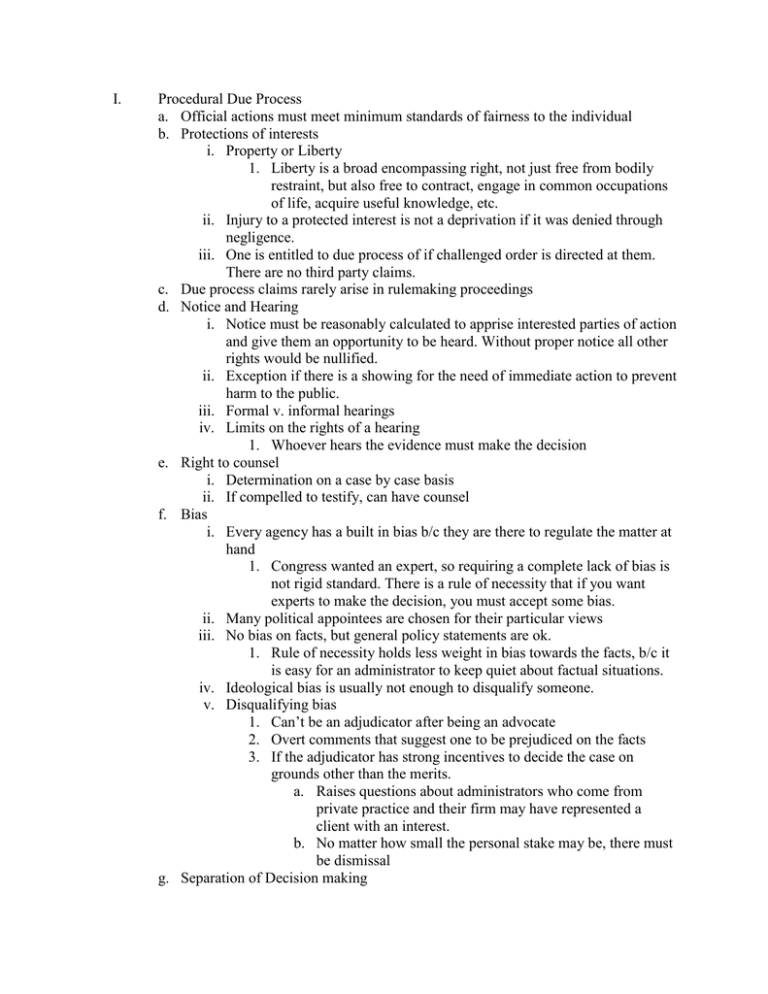
I. Procedural Due Process a. Official actions must meet minimum standards of fairness to the individual b. Protections of interests i. Property or Liberty 1. Liberty is a broad encompassing right, not just free from bodily restraint, but also free to contract, engage in common occupations of life, acquire useful knowledge, etc. ii. Injury to a protected interest is not a deprivation if it was denied through negligence. iii. One is entitled to due process of if challenged order is directed at them. There are no third party claims. c. Due process claims rarely arise in rulemaking proceedings d. Notice and Hearing i. Notice must be reasonably calculated to apprise interested parties of action and give them an opportunity to be heard. Without proper notice all other rights would be nullified. ii. Exception if there is a showing for the need of immediate action to prevent harm to the public. iii. Formal v. informal hearings iv. Limits on the rights of a hearing 1. Whoever hears the evidence must make the decision e. Right to counsel i. Determination on a case by case basis ii. If compelled to testify, can have counsel f. Bias i. Every agency has a built in bias b/c they are there to regulate the matter at hand 1. Congress wanted an expert, so requiring a complete lack of bias is not rigid standard. There is a rule of necessity that if you want experts to make the decision, you must accept some bias. ii. Many political appointees are chosen for their particular views iii. No bias on facts, but general policy statements are ok. 1. Rule of necessity holds less weight in bias towards the facts, b/c it is easy for an administrator to keep quiet about factual situations. iv. Ideological bias is usually not enough to disqualify someone. v. Disqualifying bias 1. Can’t be an adjudicator after being an advocate 2. Overt comments that suggest one to be prejudiced on the facts 3. If the adjudicator has strong incentives to decide the case on grounds other than the merits. a. Raises questions about administrators who come from private practice and their firm may have represented a client with an interest. b. No matter how small the personal stake may be, there must be dismissal g. Separation of Decision making II. III. i. Agency decision is product of a single person or small group of identifiable people but one person can advocate and decide. There is some intermingling of roles allowed h. Findings and Conclusions i. There must be a statement of findings and conclusions and reasons for the decision, even in informal rulemaking. ii. Need record to be able to ensure fairness of process, quality of decision, impose discipline on agency by requiring discipline careful decisionmaking. 1. Many agencies still use boilerplate language, which can create a problem for review. i. Ex parte communications i. Compiled record must be the exclusive record. 1. A lot of agency action is through informal contact. Procedural Shortcuts a. Because formal proceedings are long and costly agencies develop shortcuts b. Legislative rulemaking i. Once a rule is promulgated, private parties have no right ot be heard at an agency level about the rule ii. Even when the statute calls for individual determination, the agency may use rule making to resolve some issues unless Congress clearly expresses intent to deny. c. Summary Judgment d. Official Notice i. Agency has more expertise than the courts. May be aware of extra record facts relating to case before them. Allowing judicial notice can allow process to be more convenient and efficient. 1. Avoids repetitive and time consuming proof matters 2. Sometimes agency is said to be able to have broader freedom with general legislative facts instead of adjudicative. 3. Noticed material must be specifically identified and opposing part given opportunity to rebut or offer other arguments. a. Right to rebuttal is important b/c if not the trial process would useless. Essential procedural protections are useless if expert decision makers are accepting certain things as fact w/o opportunity to rebut. b. Can give the opportunity to rebut at any time so long as the opportunity to reopen the record is available. i. Must be able to make rebuttal before the agency has made their decision. ii. ALJ’s can use their skills in their area. Can resort to theories, predictions and intuitions that are incapable of exact proof. a. Different than official notice, where it could have been put into evidence but they chose not to. Adjudication a. Fourth Amendment rights IV. i. There are rights but the requirements for warrants are less than in criminal trials. ii. Must be limited to the documents required for the investigation iii. Agency cannot enforce their own subpoenas. 1. Oversight on the agency iv. Warrantless search 1. Substantial government interest relating to business 2. Unannounced business is to be able to further the regulatory scheme. 3. Statute must advise the owner of the periodic inspection program 4. Searches must be limited in time and space b. Fifth Amendment i. Rifhts against self incrimination are not present if the records are required to be kept by statute c. Decision phase i. The court can require an agency to supply an explanation to allow for judicial review even if there is no statutory requirement for such 1. Need only as much as will facilitate the review necessary. Rulemaking a. Rules have the force of law and cannot be contested, only determined whether it applies to you or not. It is important to contest and raise questions at the rule making stage. b. Provides regulated persons with a more precise notice of what conduct will be sanctioned and promotes equality of treatment c. It is more difficult for an agency to write rules than to adjudicate. The likeliness of someone being angry with the result is higher. d. Congress wanted more rulemaking b/c it allows for broader authority with less regulation, which allows the agency to cover more ground. i. The rule of particular applicability protects the rulemaking function of rate setting. e. Advantages of rulemaking i. All affected parties can participate ii. Better procedures iii. Cannot be retroactive 1. If agency is given express statutory authority to make retroactive rule, then they may. Without it, its not allowed iv. Uniformity v. Political input vi. Agency can control their agenda vii. Easier for people to research rules viii. Better oversight f. Requirements of Rulemaking i. Notice 1. In later proceedings agency cannot cite the nonlegislative rules a. Parties must have a chance to be heard as if the decision was never made. If the way policy statements are worded suggest that court will not allow for opposing parties to have a genuine opportunity to reopen the issues. Court may see the agency as giving it the force of law and therefore require rulemaking. b. If the rule expresses a position that is not deeply routed in statutory language, court may not see it as interpretive but a rule requiring APA rulemaking. i. Especially if it is a stark departure from previous legislative rules. 2. When delay through notice and comment would frustrate the rule’s purpose, it is not required. Must have good cause in its reasons why it was excluded. Other encounters skepticism from court. 3. Submission of written comments a. There is discretion over whether persons will be allowed to submit testimony or present oral argument. b. Must issue final rule with general statement of basis and purpose. i. More recent these have required longer reasons. ii. Period of public comment iii. Research iv. Hearings v. Complete record 1. Court needs a record to be able to review the basis of the decision 2. Public needs to be able to know what the agency is considering when considering the rule so that they can comment effectively. 3. If notice has not been given, ex parte communication is ok. After notice, all ex parte communication must be in writing in the public file. 4. Courts have since backed off b/c it can make the process cumbersome. 5. President’s comments on a proposed rule do not need to be documented. It is important that the President be able to talk to his executive branch. g. Formal Rulemaking i. Trial type hearing, opportunity to testify and cross examine witnesses before issuing rule ii. Sometimes it is unclear if hearing was needed from statutory language iii. Unless otherwise noted or required in enabling legislation, agency will use informal rulemaking. iv. Even where formal procedures are required there can be exceptions h. Informal rulemaking i. Court cannot review on the record ii. Court cannot review the procedure so far as it is at least what the APA requires, but can review substantively to ensure that there is a rationale basis for the decision i. Ex parte communication j. k. l. m. n. i. Any record communication, even ex parte, having central relevance to the rule must be in the public record so other participants could respond. Bias Negotiation i. Structured bargaining among competing interest groups as means for developing certain rules 1. Membership on the negotiation committee is to be balanced against various interests 2. The forwarded to the agency to go through rulemaking a. Agency is not obligated to use the negotiated version b. Not a good idea where lots of interests or no hope of compromise c. May contain illogical compromises that the agency can’t explain in reasons 3. There is no greater deference from the court, but normally review is not needed b/c everyone was involved in developing the rule. Regulatory Analysis i. Cost benefit analysis – half the states have it in their APAs. Executive order asks for such 1. Can be hard to quantify benefits 2. No accountability for ignoring it 3. Expensive (exec order requires it only for significant regulatory actions ii. Regulatory Flexibility Act 1. Makes it judicially enforceable to consider small businesses and other small interests in regulations Exemptions from Rule Making Procedures i. Good Cause 1. Emergency and public comment would have no effect on the decision ii. Unnecessary 1. If it is a technical change to the rule here is no need for notice and comment 2. The direct rule allows for specific time period to be open, and if it passes with no negative comments, it may pass. iii. Exempted subject matter 1. National security matter 2. If it only effects members of the agency and not the public 3. Procedural rules a. State APAs do not have this exemption 4. Policy statements a. B/c they are only advisory and discretionary, application can be changed and therefore comment is not needed iv. Interpretive Rule Required rulemaking V. VI. i. Generally the choice between rule or individual rule making is left to informed discretion of agency ii. Sometimes agencies have a legitimate reason to make policy through adjudication 1. May not have realized the need for policy until final stages of adjudication and it would be too time consuming and expensive to start over with rulemaking 2. May think that it can avoid public or congressional criticism if policy is fact specific o. Waiver i. Rules are usually broad and general and a waiver allows a safety valve. 1. Scalia questions whether every rule needs a waiver. Delegation of Power a. Congress can delegate power to others so long as they have declared the goal and it is only implementation of the goal that the executive or agency uses i. Congress must have an intelligible principle for the agencies to use ii. Fear of delegation is that Congress can delegate to be able to accomplish politically unpopular things, without facing the consequences iii. Not everyone has accepted Rehnquist’s view in Benzene case b/c they see the broad delegation as important to the flexibility of the administrative procedure. 1. Very difficult to develop a workable test for delegation 2. The Court has found other ways to strike down legislation that they don’t like iv. There must be procedural safe guards in delegated powers b. State Delegation i. Many still use a strict doctrine 1. There is not as much agency regulation in states 2. There are due process concerns Oversight a. Legislative veto – Congress can control the power that they have delegated to the agency. Now invalid b/c of two house system i. States do not follow Chadha holding and they can read their separation of powers differently ii. Two approaches to legislative veto 1. Functional approach – this particular use of the veto leads to an unconstitutional use of separation of powers but will allow veto in other situations. One branch is too powerful, another too weak. 2. Formal approach – bright line with no flexibility or arguments b. Line Item Veto c. Congressional Review Act – requires agencies to submit all rules to Congress before they can take effect and then using an expedited process to adopt a joint resolution to disprove the rule i. Uses bicameral system ii. Major rules must be submitted 60 days in advance iii. If disapproved, it will be treated as if the law never took place d. Other Legislative Controls i. Money 1. Appropriations a. Gives intital approval and money i. May have ceiling or other limits b. Annual Appropriations ii. Investigations 1. Can require that reports, more than the annual reports, be sent iii. Casework 1. Ombudsman e. Congressional Oversight i. Can’t interfere with the reasoned analysis of fact f. Executive Appointment of Officers i. President must appoint someone with significant authority 1. Inferior officer can be appointed by someone other than the president a. Depends on i. How long the position is held ii. How many people are overseen iii. Is there something who the position is subordinate to 1. This has superceded many of the other questions b. If his role is investigative or informative it is ok for someone else to appoint g. Removal of Officers i. Federal constitution does not speak expressly on the question of removing administrative officials from office 1. The nature of an independent agency suggests that they shouldn’t be subject to removal by the president 2. Independent agencies are supposed to be insulated from President’s political power a. Can pick their own staff h. Executive Oversight i. Three situations (from Youngstown) 1. President acts pursuant to an express or implied authorized of Congress – power at max 2. President acts in the absence of statutes supporting or prohibiting his actions – can only rely on executive constitutional powers a. The actual test of power may be more of a fact by fact determination instead of a rule of law 3. President takes action that is incompatible with the express or implied will of Congress. Power is at its lowest b/c can only rely on constitutional powers minus those of Congress. ii. OIRA 1. Parties come to the table and OIRA says this is what we think should happen, based on the president’s views, OIRA’s expertise and surveys. Most of it is informal and therefore does not need to be disclosed. Agency does not need to follow the suggestions, but must deal with the consequences of such with the executive. a. Engages in systematic scrutiny of proposed significant rules to determine if cost justified and consistent with administrative policy b. Implicates ex parte b/c of the meeting between OIRA and agency 2. OIRA now must keep public log disclosing status of rules under review and agency must identify in notice of published rule any changes it made at the suggestion of OIRA. i. Judicial review i. Court has two tasks when reviewing an agency action 1. To ensure that the agency does not exceed its delegation 2. That the agency exercised its power in a reasonable manner ii. Must go to the proper court 1. If Congress created special statutory review proceeding, party must follow that. If there is no statutory provision, can utilize any applicable form of legal action in court of competent jurisdiction. If wrong court is chosen, it can be transferred. iii. Statutory review – set out in each. Usually to court to review record, can vacate or remand. iv. Nonstatutory review 1. It is always based on some statutory grant 2. APA just tells court what to do with it after its attained the right to review 3. Individual could also a. Not ask for review and challenge it when enforced against them b. Seeking to recover damages for harm must rely on separate set of remedies 4. Agency application of law to fact requires two determination in review a. What legal constraints govern the problem at hand b. What action can be taken within the constraints v. Legal Issues 1. Chevron doctrine a. Is the statutory meaning clear? If so must follow that. i. Court can use traditional methods of statutory construction to determine if the meaning is clear. b. If not, the court should deer to agency interpretation if it is reasonable or permissible. i. Court examines the same materials as step one to determine if it can support the agency interpretation. 1. There should be discretion to the agency b/c a. Agency is more familiar with the statutes to work with b. Agency should have flexibility when dealing with issues what congress may not have considered when writing the statute c. Agency is politically accountable through ties to administration d. Deference to agency promotes uniformity instead of individual court determination ii. This does not appear to govern judicial review of every agency interpretation. It can depend on the agency determination 2. Courts have more expertise in interpreting the law, agency better with the facts vi. Substantial evidence review 1. Used to review formal adjudication or rulemaking decision a. All other proceedings are reviewed under arbitrary and capricious 2. Assesses the reasonableness of the agency fact finding a. Does not look for correct facts, just facts that support the finding. 3. Hard look – looking to ensure that the court has considered all important factual issues 4. Court must consider the whole record in reviewing 5. If there is substantial evidence for either side, the court cannot review the decision, only that there is substantial evidence for the decision the agency made. 6. If the ALJ and the agency disagree, the reviewing court should treat the agency decision as a minus factor. The agency head must fully articulate their reasons for disagreeing with any credibility questions, and then the court will decide with heightened scrutiny whether the head’s decision is supportable. vii. Abuse of discretion review 1. When the court finds that there is some compelling practicable justification for avoiding review, can conclude that action is wholly or partially committed to agency’s unreviewable discretion. a. Some discretion is not enough. Very limited 2. Court can find abuse of discretion if a. The finding was inconsistent with agency’s own rules b. It was a departure from precedent without adequate explanation i. Do not require rigid adherence to precedent c. Breaching certain common laws 3. Reasoned decision making is the touchstone of arbitrary and capricious review. Not just reasonable, but REASONED viii. Findings and reasons 1. The agencies must have explanations for their decisions a. Can only be upheld on the strength of the agency’s given rationale 2. Record must have evidence that would lead a reasonable person to the decision j. Review of Rules i. Must be consistent with the agency’s statutory mandate, Constitution, procedural requirements ii. Cannot be arbitrary and capricious 1. This is hard to prove b/c of the policy concerns, legislative facts and technical nature of the facts iii. Hard Look 1. Needs to appear that there was a reasoned decision a. Is the agency position cogent? b. Responded to criticism iv. Scientific Uncertainty 1. Judicial review should be limited and restrained in this area b/c judges not literate in this area. There still needs to be review for legitimacy. v. Agency inaction 1. Usually deferential to the agency but the refusal to institute rulemaking is subject to judicial review a. Need to be deferential to how agency allocates agency resources b. Expert agency judgments c. Discretionary function of prosecution d. Opportunity cost to other cases vi. If there is a specific mandate for enforcement discretion in the statute, must follow legislative mandate vii. Unreasonable delay reviewed through rule of reason balancing hardships to the agency and complaining party viii. Courts look to 1. Law to apply 2. Need of judicial supervision to safeguard interests of the Π 3. Impact of the review on effectiveness in carrying out its role k. Preclusion of review i. Precluded to the extent that the statute requires. 1. Congress controls jurisdiction of courts so it can preclude some matters from review ii. If statute precludes review of agency decision, can still challenge the constitutionality of the statute iii. Court usually only allow prohibition of review only if there are valid reasons 1. Depending on the reason for refusal the court could review for abuse of discretion’ 2. Will review a policy decision, but not individual determination l. Standing i. Case or controversy 1. Once claimant establishes that he was within the statutory grounds, can challenge the legality of the action on all available grounds even if they are not all relevant to his personal claim ii. Two inquiries 1. Injury in fact a. Substantial likelihood that Π can show harm and that favorable decision would actually redress the harm b. Stringent injury in fact application currently used c. Citizen suit claims – frowned on in federal, liked in state courts i. Separation of powers 2. Zone of interests a. Interest sought to be precluded by the complainant i. Not meant to be demanding and prevents review when Π’s interests are so marginally related to or inconsistent with the purposes implicit in the statute iii. Exhaustion 1. Before review, Π must have exhausted administrative remedies a. Designed to prevent regulated parties from delaying or obstructing agency ability to conduct orderly proceeding i. Also gives court the benefit of the agency’s expertise. If party waits, the need for review may not be needed. b. Highly discretionary i. Immediate review ok when established that agency is clearly exceeding its jurisdiction ii. Also if it is legal in nature, more likely to gain review early 2. Stature can narrow exhaustion by relieving requirements iv. Finality 1. Need final order of the agency for review a. Bars review of subordinate official whose decision does not directly effect the public i. However if the president is the wiper level who will sign off, there is no review under the APA b/c he is not an agency b. Refusal to look at an issue can be a final action i. Prospect that Π’s claim could cause irreparable injury on a massive scale may force review c. A letter can be a final answer d. Gov’t needs leeway to work out position on key regulatory basis v. Ripeness 1. If not ready for review, may be ambiguous and consequences difficult to predict.
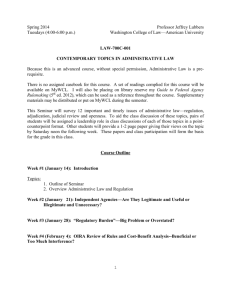
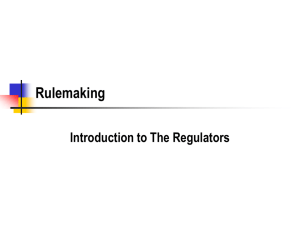
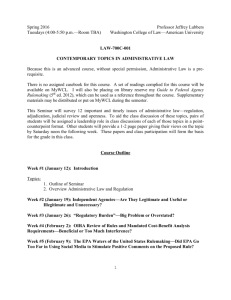
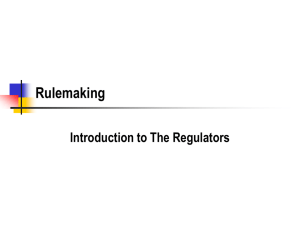
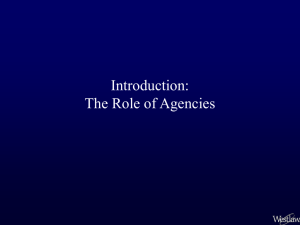
![Minnesota Department of [Name] MEMORANDUM](http://s2.studylib.net/store/data/015049440_1-475d22d0ab7bd661c71329dec0ae8429-300x300.png)